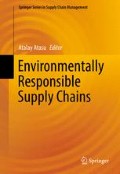Abstract
Though product reuse through closed-loop supply chains has many benefits for firms, as outlined throughout this book, consumers may not fully appreciate the benefits of buying previously used products. This conjecture led to a series of studies related to how consumers perceive reused products produced in a closed-loop supply chain. Specifically, this chapter summarizes the results from a series of studies that examined how consumers perceive remanufactured and refurbished products. The studies ranged from measuring simple reactions to remanufactured products through experimental manipulation of discount levels and brand equity as a means to determine the appeal of remanufactured products in the general U.S. consumer market. The findings breakdown into multiple levers that prompt consumer interest in remanufactured products including the usually assumed consumer greenness, quality perceptions, discounts, and brand equity. However, the studies also revealed the issue of aversion toward remanufactured products through both disgust and a segment of consumers who only desire new products.
Access this chapter
Tax calculation will be finalised at checkout
Purchases are for personal use only
References
Aaker DA (1991) Managing brand equity: capitalizing on the value of a brand name. The Free Press, New York
Aaker J, Fournier S, Brasel SA (2004) When good brands do bad. J Consum Res 31:1–16
Abbey JD, Guide VDR Jr (2013) Closed-loop supply chains. In: Bansal T, Hoffman A (eds) Oxford handbook on business and the natural environment. Oxford University Press, New York, pp 290–309
Abbey JD, Atalay AS, Meloy MG (2015a) Remanufactured products: is that which is more familiar also less disgusting. Working Paper
Abbey JD, Blackburn JD, Guide VDR Jr (2015b) Optimal pricing for new and remanufactured products. J Oper Manag 36:130–146
Abbey JD, Kleber R, Souza GC, Voigt G (2015c) The role of perceived quality risk in pricing remanufactured products. Working paper
Abbey JD, Meloy MG, Guide VDR Jr et al. (2015d) Remanufactured products in closed-loop supply chains for consumer goods. Prod Oper Manag 24(3):488–503
Abbey JD, Meloy MG, Blackburn J, Guide VDR (2015e) Consumer markets for remanufactured and refurbished products. Calif Manag Rev 57(4):26–42
Agrawal V, Atasu A, Van Ittersum K (2015) Remanufacturing, third party competition and consumers’ perceived value of new products. Manag Sci 61(1):60–72
Akturk S, Abbey JD, Geismar N, Guide VDR Jr (2016) Strategic design for remanufacturing: analyzing the complicating factors for multiple lifecycle products. Working Paper
Atasu A, Sarvary M, Van Wassenhove LN (2008) Remanufacturing as a marketing strategy. Manag Sci 54:1731–1747
Atasu A, Guide VDR Jr, Van Wassenhove LN (2009) So what if remanufacturing cannibalizes new product sales? Calif Manag Rev 52:56–76
Bechwati NN, Siegal WS (2005) The impact of prechoice process on product returns. J Mark Res 42:358–367
Blackburn JD, Guide VDR Jr, Souza GC, Van Wassenhove LN (2004) Reverse supply chains for commercial returns. Calif Manag Rev 46:6–22
Bower AB, Maxham JG (2012) Return shipping policies of online retailers: Normative assumptions and the long-term consequences of free and free returns. J Mark 76:110–124
Bras B (2010) Product design issues. In: Ferguson ME, Souza GC (eds) Closed-loop supply chains new developments to improve the sustainability of business practices. CRC Press, Boca Raton, pp 39–66
Davis S, Hagerty M, Gerstner E (1998) Return policies and the optimal level of “hassle.” J Econ Bus 50:445–460
Ferguson M, Guide VDR Jr, Souza GC (2006) Supply chain coordination for false failure returns. Manufact Service Oper Manag 8:376–393
Griffis SE, Rao S, Goldsby TJ, Niranjan TT (2012) The customer consequences of returns in online retailing: an empirical analysis. J Oper Manag 30:282–294
Guide VDR Jr, Li J (2010) The potential for cannibalization of new products sales by remanufactured products. Decision Sci 41:547–572
Guide VDR Jr, Van Wassenhove LN (2001) Managing product returns for remanufacturing. Prod Oper Manag 10:142–155
Guide VDR Jr, Van Wassenhove LN (2009) The evolution of closed-loop supply chain research. Oper Res 57:10–18
Guide VDR Jr, Teunter RH, Van Wassenhove LN (2003) Matching demand and supply to maximize profits from remanufacturing. Manufact Service Oper Manag 5:303–316
Hauser W, Lund RT (2003) The remanufacturing industry: anatomy of a giant. Boston University, Boston
Janakiraman N, Ordonez L (2012) Effect of effort and deadlines on consumer product returns. J Consum Psychol 22:260–271
Ketzenberg M, Heim G, Abbey JD, Kumar S (2015) Consumer returns: a typology and critical literature review. Working Paper
Kim J, Wansink B (2012) How retailer’s recommendation and return policies alter product evaluations. J Retail 88:528–541
Kleindorfer P, Singhal K, Van Wassenhove LN (2005) Sustainable operations management. Prod Oper Manag 14:482–492
Laseter T, Ovchinnikov A, Raz G (2010) Reduce, reuse, recycle … or rethink. Strategy Bus 61:28–32
National Retail Federation (2012) Return fraud survey 2012. Available at NRF. http://www.theretailequation.com/retailers/IndustryReports. Accessed 5 Mar 2014
Ovchinnikov A (2011) Revenue and cost management for remanufactured products. Prod Oper Manag 20:824–840
Rozin P, Millman L, Nemeroff C (1986) Operation of the laws of sympathetic magic in disgust and other domains. J Pers Soc Psychol 50:703–712
Rozin P, Fallon A (1987) A perspective on disgust. Psychol Rev 94:23–41
Souza GC (2013) Closed-loop supply chains: a critical review, and future research. Decis Sci 44(1):7–38
Subramanian R, Subramanyam R (2012) Key factors in the market for remanufactured products. Manufact Service Oper Manag 14:315–326
U.S. International Trade Commission (2012) Remanufactured goods: an overview of the U.S. and global industries, markets, and trade. Available via USITC. http://www.usitc.gov/\penalty0publications/\penalty0332/pub4356.pdf. Accessed 10 Aug 2014
Wood SL (2001) Remote purchase environments: the influence of return policy leniency on two-stage decision processes. J Mark Res 38:157–169
Author information
Authors and Affiliations
Corresponding author
Editor information
Editors and Affiliations
Rights and permissions
Copyright information
© 2016 Springer International Publishing Switzerland
About this chapter
Cite this chapter
Abbey, J.D., Guide, V.D.R. (2016). Consumer Markets in Closed-Loop Supply Chains. In: Atasu, A. (eds) Environmentally Responsible Supply Chains. Springer Series in Supply Chain Management, vol 3. Springer, Cham. https://doi.org/10.1007/978-3-319-30094-8_1
Download citation
DOI: https://doi.org/10.1007/978-3-319-30094-8_1
Published:
Publisher Name: Springer, Cham
Print ISBN: 978-3-319-30092-4
Online ISBN: 978-3-319-30094-8
eBook Packages: Business and ManagementBusiness and Management (R0)

